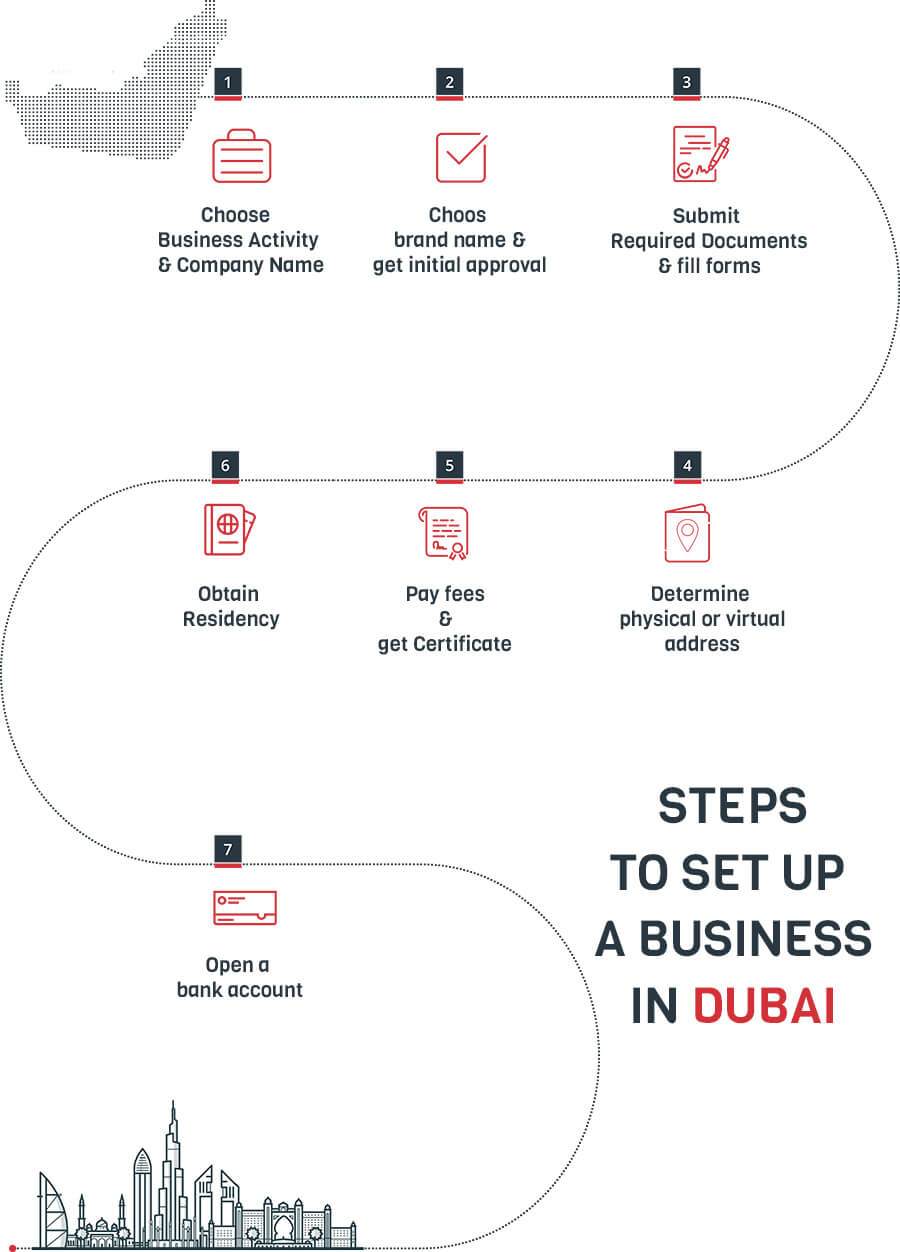Company Registration in Dubai | Full Guide to Set Up a Business in UAE

Dubai, as one of the world’s most important economic hubs, has in recent years become an attractive destination for foreign investors and entrepreneurs. Few active business owners have not considered registering a company in Dubai. With the extensive changes in the commercial laws of the United Arab Emirates in recent years, the possibility of 100% foreign ownership in many sectors has been made available, which has led to a significant increase in company registrations. Statistics show that the number of registered companies in Dubai this year has grown by more than 20% compared to last year, especially in the fields of technology, e-commerce, and financial services.
This growing interest in company registration in Dubai is mainly due to the government’s policies to attract foreign investment, a zero percent income tax, and Dubai’s strategic geographical position, which makes it a bridge between East and West.
If you also want to know how to register a company in Dubai virtually or in person, and you are looking for the rules, conditions, and costs involved, stay with us through this guide.
Table of Contents
- Advantages of Business setup in Dubai
- Types of Companies in the UAE
- Steps to Start a Company in Dubai
- Required Documents for Company Registration in Dubai
- Company Registration Costs in the UAE
- Limitations and Disadvantages of Business Set up Dubai
- What Is the Best Type of Company to Register in Dubai?
Advantages of Business setup in Dubai
Dubai, with more than 2,000 permitted business activities, provides an ideal environment for starting a business. This year, the focus on technology-based companies (such as artificial intelligence and blockchain) has increased, with more than 30% of new companies registered in these sectors.
One of the key changes is the permission for 100% foreign ownership in Mainland areas. Previously, company ownership and registration required a local partner, but now a foreigner can register a company in Dubai without a partner and be the sole owner.
Registering a company in Dubai is not only an opportunity to expand your business but also a way to obtain long-term residency and even a Golden Visa. In addition, Dubai attracts investors with incentives such as tax exemptions and access to global markets.
Below are the most important advantages of starting a company in Dubai:
💰 Tax Exemptions
- No personal or corporate income tax in many Free Zones.
- Corporate tax applies only to specific activities and those outside Free Zones (9% since 2023).
- No tax on dividends, capital gains, or inheritance.
🌍 Strategic Geographical Location
- Dubai connects Europe, Asia, and Africa.
- It has one of the world’s largest international ports and airports, making import and export extremely easy.
🏢 Different Company Structures
- Free Zone: 100% foreign ownership, tax exemption, and easy profit transfer.
- Mainland Company: Allows operations throughout the UAE and contracting with government entities.
- Offshore: For capital management and international operations without physical presence in Dubai.
🏦 Advanced Banking and Financial System
- Possibility to open corporate and personal bank accounts for foreigners in Dubai’s most reputable banks.
- Easy access to major international banks.
- Ability to transact in multiple currencies (USD, AED, EUR, etc.).
👨💼 Full Foreign Ownership
In Dubai Free Zones, there is no need for a local Emirati partner, and the owner can hold 100% of the company shares.
🛃 Visa and Residency Through Company Registration in Dubai
- Dubai residency is highly valued worldwide.
- Residency through company registration in Dubai is possible in the form of work and family residency (for the owner and employees).
- By setting up a business, you as the owner or manager can obtain a 2–3-year renewable UAE residency.
- After receiving your residency, you can also apply for family residency for your spouse, children, and parents.
Residency obtained through company registration in Dubai usually lasts 2 to 3 years and is renewable.
🌐 Economic and Political Stability and International Expansion Opportunities
- The UAE has one of the most stable economies in the Middle East.
- A secure business environment, transparent laws, and strong government support for foreign investors.
- The high international credibility of companies registered in Dubai facilitates opening branches or registering brands in other countries with the UAE’s legal backing.
⚙️ Advanced and Digital Infrastructure
- High-speed internet, smart offices, and fully online government services (from virtual company registration in Dubai to residence renewal).
- Free Zones equipped with modern facilities and fast access to logistics, warehousing, and e-commerce services.

Types of Companies in the UAE
Choosing the type of company is one of the first steps and varies based on location and ownership structure.
Mainland Company
These companies operate under the supervision of the Department of Economic Development (DED) and are allowed to conduct business across the UAE.
📌Features:
Can operate anywhere in the UAE (not limited to Free Zones).
Ability to sign contracts with government entities and local companies.
Since 2021, 100% foreign ownership is permitted in most activities (previously, a 51% local Emirati partner was required).
Requires a physical office within the UAE.
📌Common Structures:
Limited Liability Company (LLC)
Sole Establishment
Civil Company (for professional services such as legal, accounting, and consulting firms)
The most popular type is the LLC (Limited Liability Company), which requires at least one shareholder and allows 100% foreign ownership in most activities. LLCs are suitable for general trading, and the minimum capital requirement is AED 1,000. However, for certain sectors such as banking, special licenses are required.
Free Zone Company
This is the most popular option for foreign investors since it offers 100% ownership and tax advantages.
📌Features:
100% foreign ownership
Exemption from corporate tax and import/export duties within the Free Zone
Permitted to operate only within the Free Zone or outside the UAE (not in the local market without a local distributor or agent)
Eligibility to obtain work and family residency
📌Structures:
FZE (Free Zone Establishment) – single shareholder
FZC or FZ-LLC (Free Zone Company) – multiple shareholders
📍Popular Free Zones:
DMCC (Dubai Multi Commodities Centre) – for trading commodities and gold
IFZA (International Free Zone Authority) – for startups and service businesses
RAKEZ (Ras Al Khaimah Economic Zone) – lower registration costs
DIFC (Dubai International Financial Centre) – for financial and fintech services
DSO (Dubai Silicon Oasis) – for technology and IT sectors
Free Zone companies are limited to activities within the zone or for export, and registration fees start from AED 12,000.
Offshore Company
Offshore companies are used for international operations and are not allowed to conduct business within the UAE.
📌Features:
100% foreign ownership
No need for a physical office or residency in the UAE
No tax and no requirement for annual audits
Suitable for asset management, ship ownership, brand registration, or international trade
📍Popular Offshore Jurisdictions:
JAFZA Offshore (Dubai)
RAK ICC (Ras Al Khaimah)
Branch Office of a Foreign Company
This type of entity is for businesses that wish to operate in the UAE through an existing parent company abroad.
📌Features:
100% foreign ownership (under the parent company)
Allowed to carry out activities similar to the parent company
Requires a Local Service Agent (LSA) for administrative matters
A physical office is mandatory
Representative Office
This type of company is used only for marketing, market research, or project coordination, not for direct commercial activities.
📌Features:
Not permitted to generate revenue
Used solely to promote products or services of the parent company
Requires a local representative
Professional Company
Suitable for individual professionals such as lawyers, engineers, doctors, consultants, accountants, and others.
📌Features:
100% foreign ownership allowed
Requires a Local Service Agent (LSA) for licensing procedures
Activities are based on individual or professional expertise
Steps to Start a Company in Dubai
Registering a company in Dubai is a relatively fast process that usually takes 1 to 4 weeks.

After selecting the type of company and the registration zone, the general steps are as follows:
Choose the Business Activity and Company Name
First, select the business activity from the list of approved activities.
In fact, the specific field of the company must be defined so that the license can be issued accordingly.
Examples of company registration licenses in Dubai include:
- Trading License – for trading, import, and export
- Service License – for consulting, marketing, and technology
- Industrial License – for manufacturing and packaging
- Holding License – for asset management and brand ownership
The company name must be unique and comply with the Department of Economic Development (DED) naming rules, such as avoiding religious or political words.
You must propose a company name that:
- Is not duplicated
- Contains no religious or political words
- Is relevant to the business activity
- Is acceptable in English or Arabic
💡Tip: It’s best to suggest 2–3 alternative names to ensure one is approved.
Submit Required Documents, Sign Forms, and Pay Fees
Specific documents are required for company registration in Dubai, which are discussed in detail in the next section.
After the initial approval of the documents and company name, official application forms must be signed.
Finally, the license and registration fees are paid.
Payments can be made online or through a representative in Dubai.
In EZDEX, you can compare different exchange services and their rates for AED transfers to the UAE and choose one for your transaction.
Issuance of the Registration Certificate
After final approval, the business license and registration certificate will be issued.
This document serves as the company’s identification in the UAE and includes the following information:
- Company name
- Registration number
- Type of license
- Validity period (usually one year)
Provide an Official Address
Every company must have a legal address in the UAE.
In Free Zones, you can choose one of the following options:
- Physical Office
- Shared Office
- Virtual Office (Flexi Desk) – a more affordable option for startups
As mentioned earlier, having a physical office is not mandatory in Free Zones.
Open a Bank Account and Obtain Residency
After the company is registered, you must open a Corporate Bank Account.
To learn more about opening a bank account in Dubai, you can refer to the relevant guide.
If you intend to obtain Dubai residency through company registration, you can apply for a visa and residency at this stage.
Residency can be obtained for The company owner, Family members (spouse and children), and Employees (if required).

Required Documents for Company Registration in Dubai
The documents required for registering a company in the UAE are divided into two categories:
- For individuals (natural persons)
- For companies (legal entities)
If registering as an individual
|
Document |
Description |
|
Valid Passport |
Must have at least 6 months’ validity – officially translated. |
|
Digital Personal Photo |
White background, formal and recent (passport-size). |
|
Proof of Residential Address |
Utility bill (water, electricity, or phone) or residency certificate in your name – officially translated. |
|
Resume or Professional Profile (CV) |
Including work or educational background (mandatory in some Free Zones). |
|
Certificate of Good Conduct |
Required only in certain Free Zones (e.g., DMCC or DIFC); not mandatory in most Free Zones. |
|
Company Name Approval |
Official name approval must be obtained from DED. |
Additional documents for residency application include:
- Medical test in the UAE (blood test and chest X-ray)
- Biometric registration (fingerprint scan)
- Health insurance
- Several extra passport-size photos
If registering through a legal entity (parent company abroad)
|
Document |
Description |
|
Certificate of Company Registration |
With official English translation and attested by the Ministry of Foreign Affairs and UAE Embassy. |
|
Articles of Association |
Officially translated into English. |
|
Board Resolution |
Including the decision to establish a branch or a new subsidiary in the UAE. |
|
Passport of CEO or Authorized Representative |
Along with an authorization letter from the parent company. |
|
Proof of Capital or Financial Statement |
Required by some Free Zones or banks (for larger companies). |

Company Registration Costs in the UAE
One of the main concerns for those who want to start a business in Dubai is the cost of company registration.
The total cost varies depending on the type of company and its location. The table below provides an overview of the approximate costs:
|
Type of Company |
Total Cost (AED) |
Best For |
|
Free Zone |
10,000 – 15,000 AED |
Trading, services, export, residency |
|
Mainland |
20,000 – 30,000 AED |
Operating across the UAE |
|
Offshore |
6,000 – 9,000 AED |
Asset and brand holding |
As an example, the base cost for registering a Free Zone company without a physical office is broken down in the table below:
|
Item |
Average Cost (AED) |
Description |
|
License Fee |
5,000 – 8,000 |
Depends on the type of activity (Trading, Service, Consultancy, etc.) |
|
Initial Registration Fee |
2,000 – 4,000 |
Administrative costs of the Free Zone |
|
Virtual Office (Flexi Desk) |
2,000 – 3,000 |
Legal address for the company |
|
Establishment Card |
Around 1,000 |
Required for issuing residency visas |
Accordingly, if you plan to register a company in the mainland or rent a physical office, these costs will be higher.
All prices are approximate and may vary depending on your specific business and the Free Zone or mainland authority you choose.
It is also worth noting that companies in the UAE must be renewed annually.
The renewal cost for Free Zone companies ranges from 7,000 to 12,000 AED, while for mainland companies it can reach 10,000 to 18,000 AED.
Limitations and Disadvantages of Business Set up Dubai
UAE laws are both federal and local.
Although 100% foreign ownership is allowed in more than 1,000 business activities, for sectors such as oil and banking, a local partner is still required.
Companies must comply with AML (Anti-Money Laundering) and tax reporting regulations, even though income tax is zero (a 5% VAT applies).
Some general restrictions also exist. For example, company names must not be offensive, and for sensitive activities, security clearances are required.
Main challenges and disadvantages of registering a company in Dubai include:
- Intense market competition.
- High initial setup costs for newcomers.
- The need to comply with local laws and cultural norms.
What Is the Best Type of Company to Register in Dubai?
Choosing the right type of company and profitable business sector plays a key role in success.
Questions such as “Which company should I register?”, “Mainland or Free Zone?”, or “Which area has less risk?” are common — and we’ll answer them here.
Dubai offers unique opportunities for every kind of entrepreneur — you just need to choose the right path.
Below is a table showing profitable and low-risk business sectors for company registration in the UAE:
|
Sector |
Brief Description |
Profitability / Competition |
|
International Trade |
Import and export of goods (food, construction materials, electronics, clothing). |
🔥 Highly profitable but requires market knowledge. |
|
Technology, Startups & AI |
Software and app development, cloud services, tech consulting. |
🔥 High growth, low startup costs, ideal for digital entrepreneurs. |
|
E-Commerce |
Selling local or global products via Shopify, Amazon.ae, or your own website. |
💰 High profits if you master marketing. |
|
Consulting / Education / Finance Services |
Offering specialized services such as training, accounting, immigration, or design. |
📈 Suitable for professionals and freelancers. |
|
Real Estate |
Buying, selling, renting, or managing properties in Dubai. |
💸 Capital-intensive but stable returns. |
|
F&B (Restaurants, Food Trucks, Cafés) |
Always a thriving industry, especially in tourist areas. |
⚠️ Competitive but full of potential. |
Overall, for beginners or those with limited initial capital, registering a company in a Free Zone is the best option.
Free Zones such as IFZA or Meydan are among the most flexible choices for trading, consulting, or online business activities.
Read the latest news and announcements in this section.
Read the latest tutorials about payment service providers in this section.
You can access full guides and tutorial to use EZDEX services in this section.
Step by step tutorials and photo guides are available in this section.
Access the latest information about financial and economical matters in Turkey in this section.
Access the latest information about financial and economical matters in UAE in this section.
Explore expert guides, tips, and strategies for understanding and working with gold. Learn everything from basics to advanced knowledge.